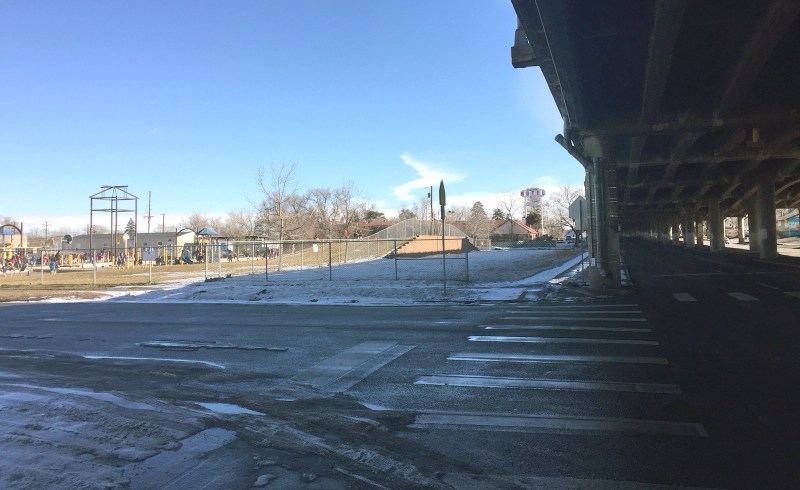Feds: CDOT’s Terrible I-70 Widening Isn’t Terrible Enough to Qualify as a Civil Rights Violation

For a half-century, the minority, low-income neighborhoods of Elyria, Swansea, and Globeville have been saddled with the traffic, noise, and pollution from freeways rammed through by state and federal road agencies. The Federal Highway Administration last week doubled down on that history by shrugging off a civil rights complaint from residents who want the Colorado Department of Transportation to nix plans for a wider I-70 in their backyards.
In the finding released Thursday [PDF], FHWA concluded, despite all evidence to the contrary, that tripling the width of I-70 would not disproportionately and adversely affect north Denver residents, and that CDOT went through the motions to gain federal approval.
The Denver Department of Environmental Heath study linking the pollution-spewing freeway to poor neighborhood health [PDF] was not sufficient grounds for the FHWA.
“In fact, the preferred alternative is projected to reduce Elyria-Swansea residents’ exposure to emissions and air toxics by alleviating congestion in the community,” the report states cheerfully. It’s the same thinking that’s been devastating urban neighborhoods for decades — ignoring the fact that the immediate congestion relief will be short-lived, and that road widening projects generate more traffic and more pollution in the long run.
The FHWA doesn’t dispute that people will be displaced, and that this displacement will primarily affect Hispanic residents:
“Due to the relatively large amount of residential relocations, and the likelihood that these relocations will disproportionately affect Hispanic residents, the preferred alternative could have a disparate and adverse impact on Elyria-Swansea.”
It’s just that this discriminatory impact is unavoidable, as far as the feds are concerned:
“FHWA finds, however, that even if the selection of the preferred alternative resulted in adverse, disparate impacts, [CDOT] has provided a substantial and legitimate justification for its actions and shown that a less discriminatory alternative has not been identified.”
FHWA also claimed that CDOT’s widening project has “community support” and insisted that a four-acre park being built on top of the new, bigger highway will heal old neighborhood scars. Thousands of local residents opposed to the project would disagree.

“We are obviously disappointed with the Federal Highway Administration’s decision,” Earthjustice attoney Joel Minor said. “And I think that decision failed to fully grapple with the factual information and the legal arguments that we submitted on behalf of our clients.”
Local advocates have proposed rerouting I-70 north along I-270/76 and replacing this section of the highway with a tree-lined boulevard. FHWA did not consider that option as a genuine alternative, accepting at face value CDOT’s claim that tearing down I-70 would be more expensive than digging a trench and widening it. The federal finding did not acknowledge an analysis submitted by Earthjustice that questions CDOT’s findings.


